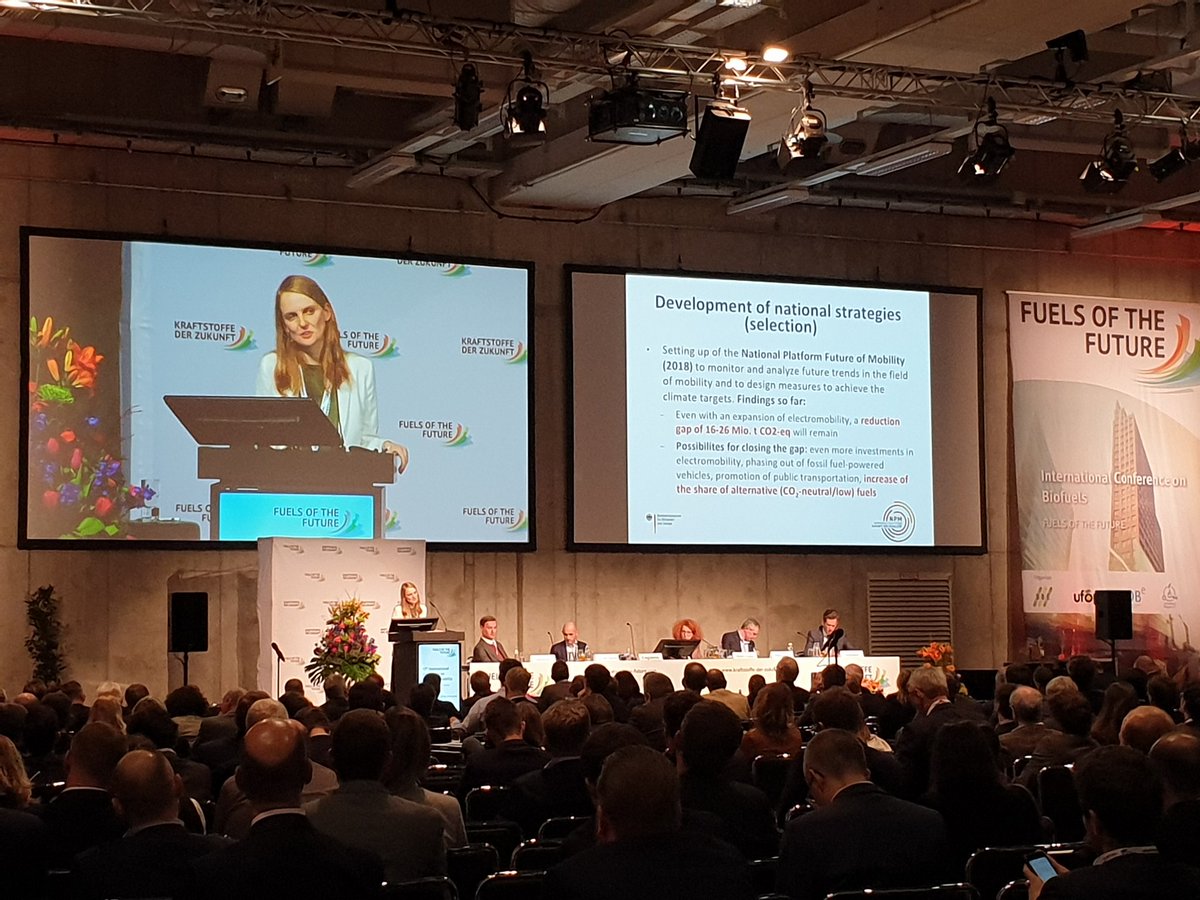
Renewable Fuels Are Crucial
International Conference on Renewable Mobility Discusses the "Green Deal" and Defossilisation of the Transport Sector
Discussions and presentations at the 17th International Conference on Renewable Mobility focus on the impact of the German government's climate protection package and the new European Commission's "Green Deal". The European Commission intends to ramp up its climate protection efforts through the "Green Deal", which is also designed to ensure sustainable and intelligent mobility. Renewed discussions on the transport sector are planned, in particular on CO2 fleet limits for the automotive industry and the recast Renewable Energy Directive (RED II). The conference organisers believe that renewable fuels play a crucial part in implementation of the "Green Deal" and in achieving a defossilised transport sector, as the combustion engine will continue to play an important role in years to come.
Numerous measures are required to cut greenhouse gas emissions in the transport sector. Alongside more widespread introduction of electric mobility, it will also be vital to increase use of renewable liquid and gas energy sources, such as electricity-based fuels and certified sustainable biofuels. As well as cutting emissions, the associated drive mix will help maintain key European value chains in the automotive industry. At the same time, a mobility strategy that is open to new technologies ensures the transport sector will be able to adapt to future challenges.
The bioenergy associations' proposals on attaining climate protection targets in the transport sector:
Expand the tried-and-tested greenhouse gas reduction quota
Greater use of renewable fuels in the transport sector means their climate protection potential can be exploited more effectively. The bioenergy associations consider that gradually increasing the greenhouse gas reduction quota to 16 percent by 2030 is a viable means to attain this goal. Biofuels already make the largest contribution to CO2 savings in the transport sector. 9.5 million tonnes of CO2 equivalents have been avoided thanks to use of certified sustainable biofuels.
CO2 pricing for fuels with the right steering effect
Provisions on exempting sustainable biofuels from the emissions trading system for fuels, which is set to enter into force in Germany from 2021, must be designed to ensure that no additional CO2 charge is imposed on renewable fuel blend components. This would provide the right incentive for consumers to use low-emission fuels.
Harmonisation of the European Renewable Energy Directive and the European Commision's "Green Deal" The bioenergy associations advocate increased deployment of renewable energies in the transport sector in the context of implementation of the "Green Deal" and the associated review of European provisions on renewable energies (Renewable Energy Directive RED II). The share of such energy sources should be increased from 10 percent in 2020, going up by two percent every two years, and reaching 20 percent in 2030. To date, the European target for renewable energies in transport is only 14 percent, which experts agree is insufficient to achieve the greenhouse gas reduction targets.
Taking renewable fuels into account in CO2 fleet regulation
The planned revision of European fleet limits must ensure that emissions reductions in the transport sector thanks to use of renewable fuels can be offset against the strict CO2 limits. This would foster optimization of climate-friendly drive technologies.
The international conference offers a fitting forum for information and discussion on potential solutions for mobility in the future:
More than 600 participants from 25 nations accepted the invitation from five German bioenergy industry associations to find out more about market developments, technological innovations and the future of renewable mobility.
At the inaugural plenary on 20th January 2020 from 10 a.m., speakers from the worlds of politics and science presented their analysis of fitting measures to achieve climate protection linked to sustainable, renewable mobility:
Artur Auernhammer, MP and chairman of the board of the German Bioenergy Association, presented an overview of biofuels' importance in reducing greenhouse gases in the transport sector.
Dr. Tamara Zieschang, State Secretary in the Federal Ministry of Transport and Digital Infrastructure, addressed climate protection goals in transport and related issues of enforcement and acceptance of policy measures.
Prof. Dr. Henning Kagermann, Chair of the "Future of Mobility National Platform" convened by the Federal Minister of Transport, presented results from the expert commission to date. This commission involves relevant stakeholders as well as specialist experts and politicians in the debate on tomorrow's mobility.
Prof. Dr. Claudia Kemfert, German Institute for Economic Research (DIW Berlin), addressed current developments in climate protection legislation and explained which measures in the transport sector that are suited to implementation in the short term would lead to improved climate protection. Failure to meet European climate protection targets could result in penalties. A study by DIW Berlin has examined in particular the contribution biofuels can make to reducing financial risks for the federal budget.
Dr. Jörg Adolf, Stakeholder Relations Manager at Shell Deutschland Oil GmbH, considered the importance of alternative fuels for a leading company in the mineral oil and gas industry.
Prof. Dr. Jürgen Krahl, President, Ostwestfalen-Lippe University of Applied Sciences and Arts, examined prospects for the combustion engine and alternative fuels within the framework of international climate protection concepts.
Over and above a panel discussion and 12 forums, the two conference days on 20th and 21st January 2020 encompass presentations and debates on a range of topics including CO2 targets for new vehicles, Power-to-X, biomethane, bioethanol, new drive and mobility concepts, sustainability, biofuels in aviation and shipping, as well as in agriculture and forestry.
More than 60 speakers from 12 nations in Europe and from further afield are presenting examples from practice, concepts, and studies on debates relating to the mobility of the future.


 Union zur Förderung von Oel- und Proteinpflanzen E.V.
Union zur Förderung von Oel- und Proteinpflanzen E.V.